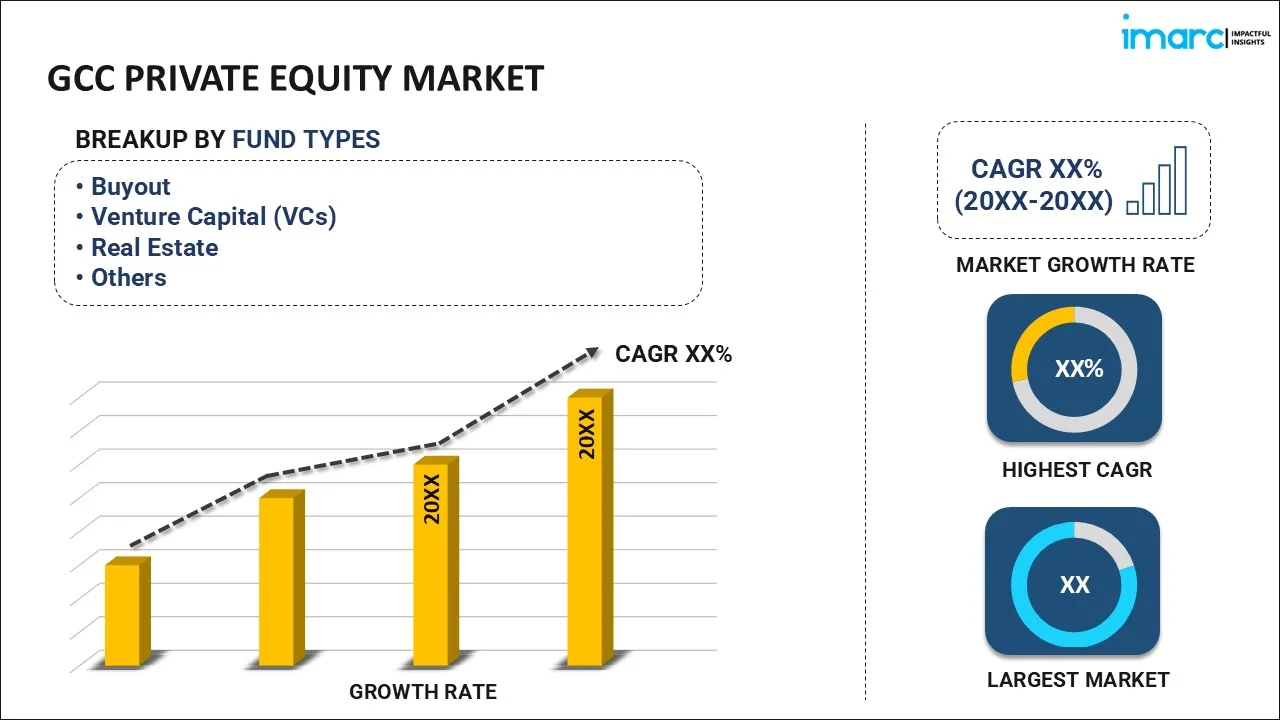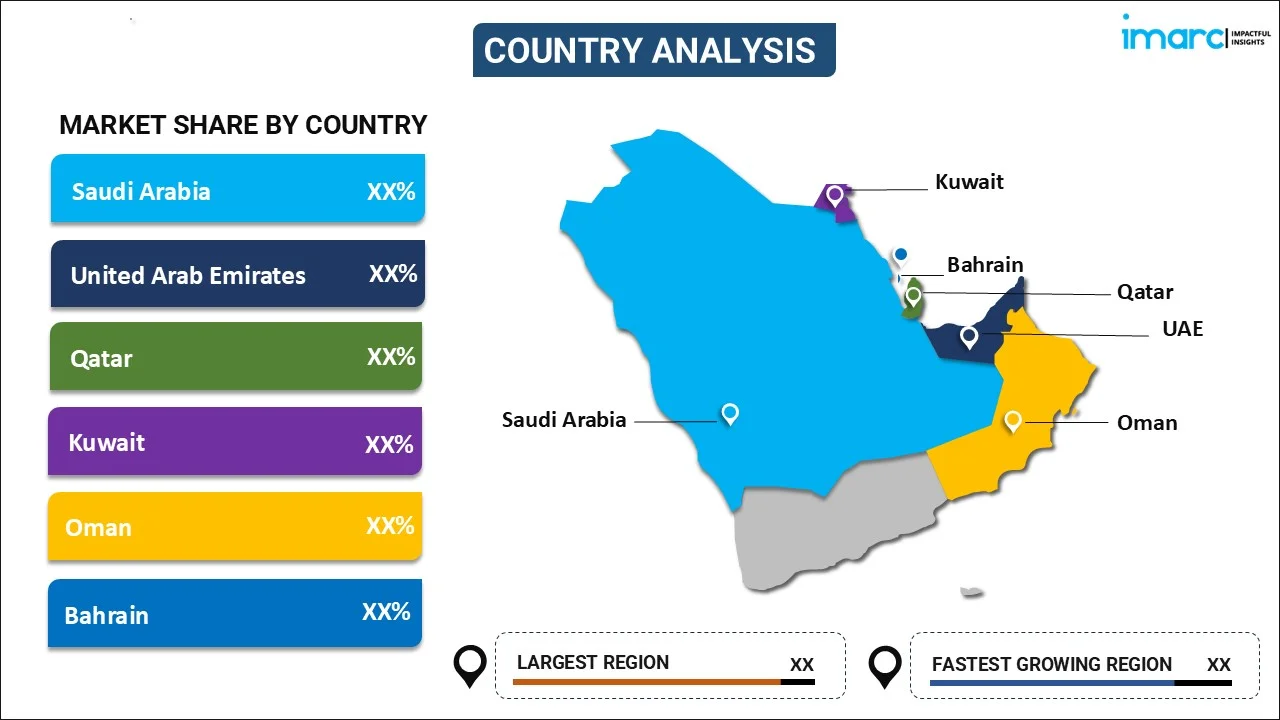
GCC Private Equity Market Report by Fund Type (Buyout, Venture Capital (VCs), Real Estate, Infrastructure, and Others), and Country 2025-2033
Market Overview:
The GCC private equity market size reached USD 4.2 Billion in 2024. Looking forward, IMARC Group expects the market to reach USD 7.6 Billion by 2033, exhibiting a growth rate (CAGR) of 6.4% during 2025-2033. The growing emphasis on diversification and reducing dependence on oil revenues, the prolonged low-interest-rate environment in the region, and the increasing interest from sovereign wealth funds and international investors represent some of the key factors driving the market.
|
Report Attribute
|
Key Statistics
|
|---|---|
|
Base Year
|
2024 |
|
Forecast Years
|
2025-2033
|
|
Historical Years
|
2019-2024
|
| Market Size in 2024 | USD 4.2 Billion |
| Market Forecast in 2033 | USD 7.6 Billion |
| Market Growth Rate (2025-2033) | 6.4% |
Private equity refers to a form of alternative investment where funds are raised from high-net-worth individuals, institutional investors, or accredited investors to invest in privately held companies or acquire stakes in existing businesses. The primary goal of private equity is to generate significant returns for its investors by actively managing and growing the portfolio companies over a defined investment period. Private equity firms typically seek to acquire a significant ownership stake in the companies they invest in, providing them with a level of control and influence over the business operations. Once the investment is made, these firms work closely with the management teams of their portfolio companies to implement strategic initiatives, improve operational efficiency, and drive growth. Often, private equity firms look for companies with untapped potential, aiming to turn them around, make them more profitable, and eventually sell them for a substantial profit.
GCC Private Equity Market Trends:
The growing emphasis on diversification and reducing dependence on oil revenues is driving the market in GCC. Private equity firms play a crucial role in supporting this diversification process by investing in non-oil sectors, such as technology, healthcare, infrastructure, and consumer goods. Moreover, the prolonged low-interest-rate environment in the GCC region has also fueled the demand for private equity investments. As traditional fixed-income instruments offer lower yields, investors have sought higher returns in alternative assets, such as private equity. Additionally, the long-term investment horizon of private equity aligns with the patient capital approach, enabling investors to realize substantial returns over an extended period. Furthermore, the favorable exit opportunities provided by the public markets, mergers, and acquisitions, or secondary sales contribute significantly to private equity's attractiveness. Successful private equity investments are often taken public through initial public offerings (IPOs) or sold to strategic buyers, providing liquidity to investors, and allowing them to recycle capital into new investments. The market is further driven by access to specialized expertise. Private equity firms often bring in industry experts and seasoned professionals to work closely with portfolio companies, providing strategic guidance and operational expertise. This hands-on approach can lead to improved efficiency and growth, which, in turn, generates higher returns for investors. Also, the increasing interest from sovereign wealth funds and international investors has further accelerated the growth of the private equity market. As the capital flows become more accessible, private equity firms can tap into a broader investor base, enhancing their ability to raise larger funds and make significant investments across borders. Besides, the evolving regulatory environment also plays a role in shaping the private equity market. While regulations can impose certain limitations and reporting requirements on private equity firms, they have also provided avenues for growth, such as allowing pension funds to invest in alternative assets, including private equity.
GCC Private Equity Market Segmentation:
IMARC Group provides an analysis of the key trends in each segment of the GCC private equity market report, along with forecasts at the regional and country levels for 2025-2033. Our report has categorized the market based on fund type.
Fund Type Insights:

- Buyout
- Venture Capital (VCs)
- Real Estate
- Infrastructure
- Others
The report has provided a detailed breakup and analysis of the GCC private equity market based on the fund type. This includes buyout, venture capital (VCs), real estate, infrastructure, and others.
Country Insights:

- Saudi Arabia
- UAE
- Qatar
- Bahrain
- Kuwait
- Oman
The report has also provided a comprehensive analysis of all the major country markets, which include Saudi Arabia, UAE, Qatar, Bahrain, Kuwait, and Oman.
Competitive Landscape:
The report has also provided a comprehensive analysis of the competitive landscape in the market. Competitive analysis such as market structure, key player positioning, top winning strategies, competitive dashboard, and company evaluation quadrant has been covered in the report. Also, detailed profiles of all major companies have been provided.
GCC Private Equity Market Report Coverage:
| Report Features | Details |
|---|---|
| Base Year of the Analysis | 2024 |
| Historical Period | 2019-2024 |
| Forecast Period | 2025-2033 |
| Units | Billion USD |
| Scope of the Report | Exploration of Historical and Forecast Trends, Industry Catalysts and Challenges, Segment-Wise Historical and Predictive Market Assessment:
|
| Fund Types Covered | Buyout, Venture Capital (VCs), Real Estate, Infrastructure, Others |
| Countries Covered | Saudi Arabia, UAE, Qatar, Bahrain, Kuwait, Oman |
| Customization Scope | 10% Free Customization |
| Post-Sale Analyst Support | 10-12 Weeks |
| Delivery Format | PDF and Excel through Email (We can also provide the editable version of the report in PPT/Word format on special request) |
Key Questions Answered in This Report:
- How has the GCC private equity market performed so far and how will it perform in the coming years?
- What has been the impact of COVID-19 on the GCC private equity market?
- What is the breakup of the GCC private equity market on the basis of fund type?
- What are the various stages in the value chain of the GCC private equity market?
- What are the key driving factors and challenges in the GCC private equity market?
- What is the structure of the GCC private equity market and who are the key players?
- What is the degree of competition in the GCC private equity market?
Key Benefits for Stakeholders:
- IMARC’s report offers a comprehensive quantitative analysis of various market segments, historical and current market trends, market forecasts, and dynamics of the GCC private equity market from 2019-2033.
- The research study provides the latest information on the market drivers, challenges, and opportunities in the GCC private equity market.
- Porter's five forces analysis assist stakeholders in assessing the impact of new entrants, competitive rivalry, supplier power, buyer power, and the threat of substitution. It helps stakeholders to analyze the level of competition within the GCC private equity industry and its attractiveness.
- Competitive landscape allows stakeholders to understand their competitive environment and provides an insight into the current positions of key players in the market.
Need more help?
- Speak to our experienced analysts for insights on the current market scenarios.
- Include additional segments and countries to customize the report as per your requirement.
- Gain an unparalleled competitive advantage in your domain by understanding how to utilize the report and positively impacting your operations and revenue.
- For further assistance, please connect with our analysts.
 Request Customization
Request Customization
 Speak to an Analyst
Speak to an Analyst
 Request Brochure
Request Brochure
 Inquire Before Buying
Inquire Before Buying




.webp)




.webp)












